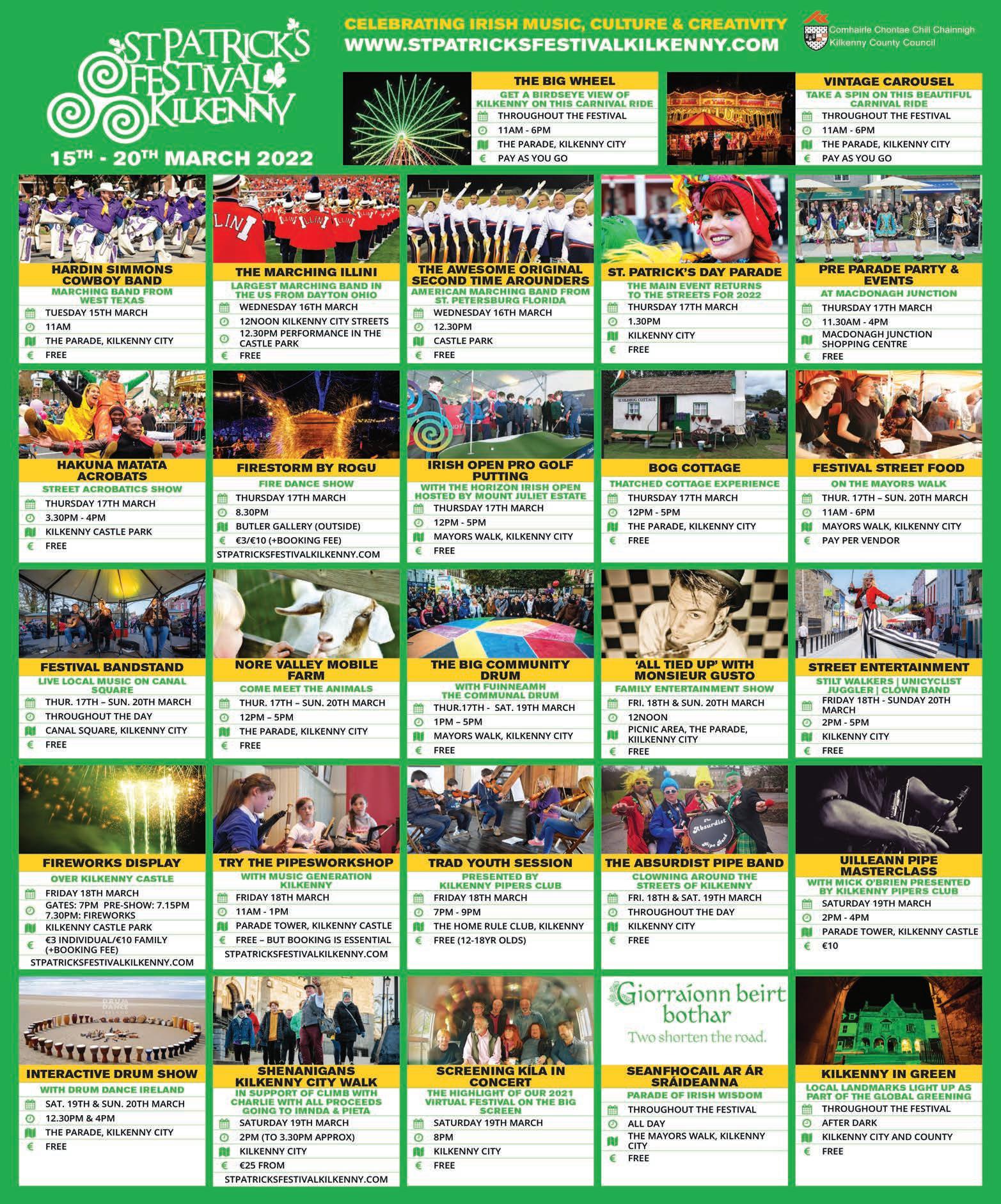
7 minute read
John Ellis
Why we must support local business
BY JOHN ELLIS
Advertisement
FINANCIAL ADVISOR
IRELAND is a favourite destination among expats, according to the website www. internationalcitizens.com. It’s a friendly country with an excellent educational system and a high standard of living. But they warn, if you are considering moving to Ireland to live, the cost of living should be a primary consideration.
We recognise and probably agree that Ireland is an expensive place to live. According to the economist Jim Power, in a new report for the Champion Green ‘Support Local’ initiative, there is a strong sense in Ireland that this cost-of-living squeeze is an Irish phenomenon alone. is perception is actually not true, as nearly every country in the developed world was, and is, grappling with the highest rates of in ation in decades with costs continuing to rise globally and now exacerbated by the Russian Ukrainian war.
As discussed in previous articles, pent-up demand due to Covid restrictions rebounded strongly late last year but unfortunately impacted supply, with consumer prices increasing by 5.5%, the highest since 2001.
Its normal when prices rise to look around for better deals with on-line and crossborder shopping being two favourites. But we need to remember that these same factors are at play in most developed economies, so buying online does not equate to lower prices, especially when VAT and customs duties have to be considered. erefore, it is important that Irish consumers who have shopped online, still shop with local retailers online, or in person, as far as possible as it is vital Irish consumers bear in mind “the multiplier e ect of supporting local, helping support Irish jobs and regional economic and social vibrancy”.
For instance, I bought a non- ction hardback book recently in a local bookshop. e jacket price was €32.50 but knocked back to €23.50. I’m enjoying the read but it has turned slightly sour when I see the same on Amazon for €9!
A missed opportunity? – maybe for me, in the short term, but it’s important that you and I recognise and address each online purchase with an overseas vendor as an out ow of money from the Irish economy which undermines the competitiveness of Irish businesses.
Jim Power says: “Every euro spent in the domestic economy is paid out in wages and pro ts, which are taxed, so, in turn, they get re-circulated in the economy. Every euro results in an injection of at least €2.50 into the local economy. is is particularly important as we try to rebuild social services like healthcare and education after the damage caused by the pandemic restrictions.”
Yes, cost-of-living increases are a real threat to the recovery of Kilkenny and all local economies especially when so many shoppers have been driven online due to Covid. But now we must remember as pre-covid normality returns jobs and prosperity relies more than ever on our actual local spending patterns.
To help with this, Champion Green, a national movement with representation from government, industry, business, and the public together are encouraging people to support each other and drive the recovery of our communities and economy after the Covid crisis.
Marian O’Gorman, Champion Green founder, says: “By supporting local businesses, our spend makes them stronger and able to compete. Lower prices are possible when stores or manufacturers have more volume. So, each and every shopper in Ireland can help push down the cost of living by keeping money in circulation locally.”
If you want to become involved download the Champion Green Rewards App. is App brings digital loyalty solutions to more businesses in Ireland. Champion Green is partnering with Visa and LoyalBe o ering a digital product which they believe is more e cient that the usual paper or card-based loyalty schemes.
It enables the retailers to see in real time how their customers are actually engaging with their company, making it easier for business owners to adapt to their customers behaviour. Likewise the customer once signed up starts earning rewards every time they pay with Visa.
Why not do your bit as many local businesses have already signed up?
John@ellis nancial.ie 086 8362633

Ailbhe Reddy joins April Sounds

Ailbhe Reddy plays the Medieval Mile Museum on Sunday April 10th as part of April Sounds in aid of Ukraine emergency appeals
FRESH from a sold out Button Factory, alt-folk artist Ailbhe Reddy joins April Sounds next month with support from Kilkenny’s Elise at the Medieval Mile Museum on Sunday, April 10th.
Ailbhe Reddy has an incredible talent for crafting intensely moving tunes. An artist who nds strength in sensitivity and embraces the full power of a moment. On her debut album Personal History, the Irish artist blurs the boundaries between personal and universal experiences to strike emotional chords with her relatable lyricism and uniquely tender vocals.
Reddy recently performed the Choice Prize nominated song of the year ‘Home’ by Elaine Mai and Mary-Kate Geraghty with guests Loah and Sinead White in Vicar Street.
Joined on the night by Kilkenny singer-songwriter Elise. Elise’s songwriting comes from a collection of personal experiences. e core of her songwriting is about love, loss and growth and nding the light in dark times. Her music combines her folky ngerstyle guitar playing with a production of synth sounds and a heavy rhythm section of bass and drums. is runs parallel to her soft but powerful voice which has the power to draw the listeners in and immerse them into her world and her stories she needs to tell.
Proceeds from tickets go to the Red Cross and Unicef who are running emergency appeals. Tickets priced at €12 and available from Rollercoaster Records www. rollercoasterrecordskk.com
April Sounds are delivered locally by Kilkenny County Council Arts O ce and funded by the Department of Tourism, Culture, Arts, Gaeltacht, Sport & Media.
Much to learn from the more experienced
ANDREW MCDONALD HYPNOTHERAPIST
CULTURAL di erences are plentiful between West and East. Some things are better here, others there and a myriad of nuances exist which are neither superior nor inferior but which t in with the ambiance of their surroundings. e world is beautiful because it’s di erent. However, this doesn’t mean we can’t learn from each other.
One area of learning we could bene t from in the West is how we view our older citizens. In times gone by, yet not all that long ago, people of a certain age were valued for the great deal of life experience they had. In modern parlance “they had been there, done that and bought the t-shirt”. Nowadays, in a seemingly desperate crusade for modernisation, which has at its root the chase of money, we often dismiss the lessons and guidance those more advanced in age can o er.
Compare common perceptions of older people in the West and East today. In cultures belonging to the former, concepts such as old-fashioned, past it and outdated proliferate. In the latter, wisdom, sound judgement and understanding are perhaps the prevailing ideas.
You name it, older people have done it. ey’ve parented, worked and built careers, fostered communities and societies, cared for others and if we think of advancements which have occurred since they were our age, it was frequently our seniors who crafted them. We not only do them an injustice by disregarding them, we do ourselves a disservice.
If we want a glaring example from history of what can happen when we ignore our elders, contrast Roman and post-Roman society in Europe. Ancient Rome developed an early form of the newspaper, modern plumbing and sanitary management, arches to build structures, central heating, aqueducts, the rst surgical tools and developed concrete for strengthening buildings. Every modern stadium is, to a greater or lesser degree, modelled on the Colosseum. at huge arena held up to 80,000 and was able to empty completely within 25 minutes. Were it in use today it would be approximately the ninth biggest European stadium. Following Rome’s collapse, the Dark Ages arrived and these developments were lost for several centuries. We would do well to pay attention to such occurences. As Spanish philosopher George Santayana stated “those who do not learn from history are doomed to repeat it”. ere is a danger, of course, in becoming too nostalgic. It would be silly to suggest there was nothing bad when our elders were younger. So too to moot the idea that we haven’t improved anything. However, given that many of us bemoan the loss of things senior citizens held dear in their youth like respect, manners or a sense of community, we should make more of an e ort to learn from, rather than ignore, them. Perhaps that simple act would go a long way to adding a bit of the kindness which many decry as being in short supply in today’s society.









